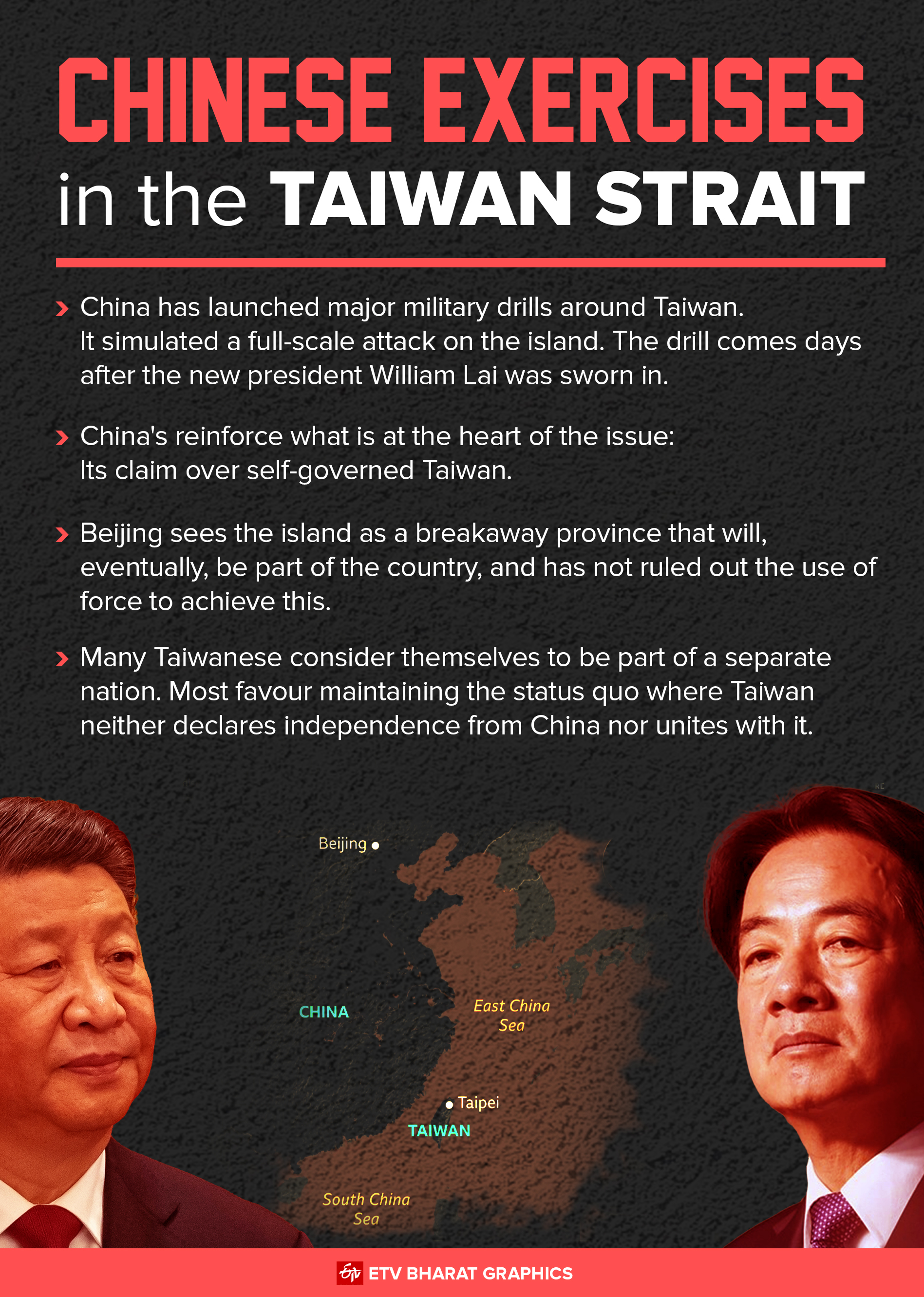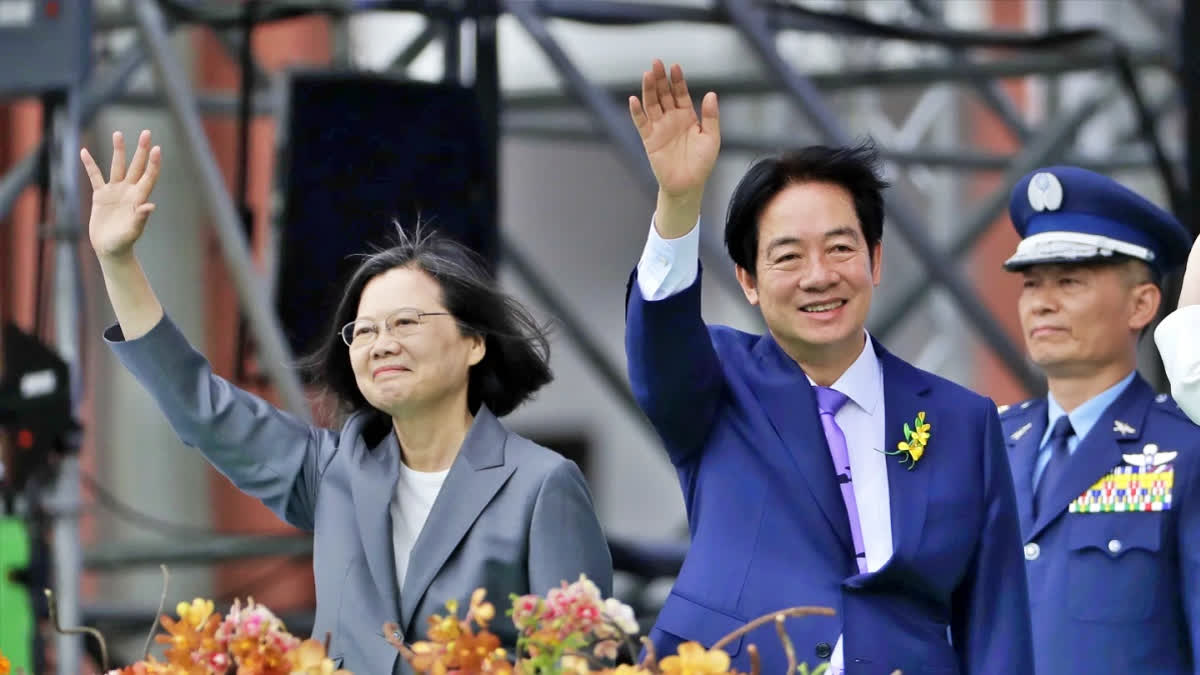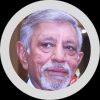Taiwan’s new president, Lai Ching-te, was sworn in on 19 May 2024. In his inaugural address he mentioned, ‘I hope that China will face the reality of (Taiwan)’s existence, respect the choices of the people of Taiwan, and in good faith, choose dialogue over confrontation.’ The Chinese leadership dislikes Lai as he is against reunification. In his speech, Lai sought peace with China, while promising to never yield to Chinese threats.
China had attempted to influence Taiwan’s elections but failed. Beijing had deployed ships and aircraft, intending to browbeat the Taiwanese to elect the opposition candidate, Hou You-Yi, during elections in Jan this year. Thousands of fake Facebook and X accounts were deleted as they were intended to influence the elections.

The Chinese navy, deployed off the coast of Taiwan, regularly broadcasted on Taiwanese frequencies, ‘The People’s Republic of China is the only legitimate government of China, and Taiwan is an inseparable part of China.’ For the Taiwanese, similar warnings have been a regular occurrence since 1996.
Lai’s swearing-in was a redline, resulting in China conducting its Joint Sword-2024A exercise off the Taiwan coast a few days later. The name indicated that more such exercises can be expected this year. In recent years, China has been conducting military exercises off the Taiwanese coast, as a sign of displeasure.
The Chinese government mouthpiece, The Global Times, stated in an op-ed that the exercise, ‘shocked Taiwan independence secessionist forces.’ It added, ‘The goal of the exercise is to clearly warn the Lai authorities that seeking independence is a dead end.’ A total of 111 aircraft and 46 surface vessels of both the PLA navy as also its Coast Guard were deployed. The reality was however vastly different.
While Taiwan alerted its armed forces as a precaution, the US and Japan appeared to only monitor Chinese activity without too much concern. It was evidently a display of force, nothing more. This flowed from the nature of deployment and type of vessels employed. China was expected to react to Lai’s assumption of Presidentship amidst the presence of US representatives. The US was also aware that the PLA is still unprepared for any major operation and the exercise was more aimed at convincing its domestic audience that it retains power over Taiwan.
Taipei Monitoring China's Military Activity
Taipei was not taking chances, aware that China could attempt a misadventure in the garb of exercises as it had done in Ladakh in 2020. For Taiwan, the threat was not the mainland but outlying islands. Taiwan has been observing all Chinese military activities to monitor Beijing’s intent.
As per the Chinese government, the exercises focused on ‘joint sea-air combat-readiness patrols, seizing battlefield control and joint precision strikes.’ It also claimed to have exercised the ‘blockade of Taiwan.’ This is the third time, in recent years, China has conducted such large-scale exercises. As per reports, current exercises were closer to Taiwan than their earlier versions. There would be different indicators whenever China means business.
The US, as per protocol, displayed concern over their activities. Its state department released a statement mentioning, ‘Using a normal, routine, and democratic transition as an excuse for military provocations risks escalation and erodes longstanding norms that for decades have maintained peace and stability across the Taiwan Straits.’ There was no enhanced readiness on US bases in near vicinity.
US Indo-Pacific Commander, Admiral Samuel Paparo, in an interview to a media outlet, mentioned that the exercises ‘looked like a rehearsal.’ He added, ‘We watched it. We took note. We learned from it, and they helped us prepare for the future.’ Every exercise of the adversary provides lessons for the defender.
Post the meeting last week between US Secretary of State, Lloyd Austin, and his Chinese counterpart, Admiral Dong Jun, on the sidelines of the Shangri-la dialogue in Singapore, the US released a statement mentioning, ‘The secretary expressed concern about recent provocative PLA activity around the Taiwan Strait, and he reiterated that China should not use Taiwan's political transition - part of a normal, routine democratic process - as a pretext for coercive measures.’ The Chinese, on their part reiterated that Taiwan is their internal matter.
The Chinese defence minister stated in the Shangri-la dialogue that ‘anyone who dares to split Taiwan from China is bound to be smashed to pieces and bring about their own ruin.’ He reiterated that ‘China's handling of the Taiwan question in accordance with the law is entirely a matter of China’s internal affairs, which brooks no foreign interference.’ For China, Taiwan is a subject which is sensitive.
On his part, Lloyd Austin, hinting at China’s actions in the Taiwan straits, mentioned, ‘the peaceful resolution of disputes (should be) through dialogue – not coercion or conflict. And certainly not through so-called punishment.’
US Senator and Foreign Affairs Committee Chair, Michael McCaul, who was in Taipei for the swearing-in, stated that US promised military aid would soon be arriving on the island, strengthening Taiwanese defences. This, as expected, was criticized by Beijing as interference in its internal matters, not that it mattered to anyone.
Impact Of Chinese Exercises
If China presumed that its military threat would make the Taiwanese bend, it was largely mistaken. After all, Chinese muscle flexing and blackmail throughout their election process had also failed to work.
The war of words on the exercise resonated on both sides. The Chinese claimed, ‘Those who play with fire will burn themselves. Taiwan independence’ (forces) provoke us, we will push our countermeasures forward until the complete reunification of the motherland is achieved.’ The Taiwanese countered, ‘If the Chinese Communist Party does attack Taiwan, it won’t be easy for them to take Taiwan. Taiwanese people are not afraid of war.’
The Global Times, famous for its fake propaganda, discussing the current exercise quoted a supposed Taiwanese fighter pilot, mentioned, ‘Since this year, many pilots on the team (Taiwanese air force) have asked to retire. Some young pilots are even willing to pay compensation to leave.’ The reality was the reverse. Taiwanese forces are well motivated to thwart Chinese misadventures.
China, for the first time, deployed its navy off Taiwan’s eastern coast as part of the exercise. This enabled the US and Taiwan to reassess Taiwan’s military requirement including long-range anti-ship missiles, which would be next on the agenda for procurement. Taiwan has already strengthened its outlying islands for such an eventuality. The US Congress had recently cleared USD 8.1 billion for Taiwan. However, China did display that it possesses the ability to blockade Taiwan, prior to any invasion. How effective will it be is unknown.
Psychological warfare
China attempted psychological warfare on the Taiwanese by display of its military power. In retaliation, Taiwan released videos and images of its troop preparations, morale and determination to quell any Chinese invasion. Su Tzu-yun, a military analyst from Taiwan mentioned, ‘Taiwanese authorities neutralized the effect of China’s psychological warfare by releasing videos of the Taiwanese military tracking Chinese military activities around the island.’
The Chinese intent was never war, just intimidation, which did not succeed. If it had other motives, there would have been a different methodology adopted including deployment of troop carriers, evacuation of residents along the coast, closure of global shipping and aircraft routes. Taiwan was aware and reacted accordingly.
The Taiwanese have witnessed China breaking its undertaking on Hong Kong, hence would never fall for any reassurance issued by Beijing. China had promised ‘one-nation two systems’ for Hong Kong, but soon deviated. It is promising Taiwan the same. Neither would the west desire that China take Taiwan, as the impact could be catastrophic for Japan’s security as also the global supply chain of semiconductors.
With Lai Ching-te as President of Taiwan, tensions will not cease between the two. China considers him as pro-independence. Xin Qiang, director of Taiwan Studies Centre at Fudan University, was quoted in the Global Times as mentioning, ‘The escalation of cross-Straits tensions is inevitable. In the future, the Taiwan Straits may see even more turbulences compared to the period when Tsai Ing-wen (Lai’s predecessor) was in the office.’
How does it impact India?
New Delhi is not party to the dispute, however, would be monitoring Chinese actions closely. For China, Taiwan and Arunachal alongside islands in the South and East China sea are unfinished agendas. It would at some stage attempt to display aggressiveness against one of its unfinished agendas, especially as turmoil continues in Europe and the Middle East, drawing US attention.
Austin did state in Singapore that ‘The United States can be secure only if Asia is secure,’ indicating that its focus remains to prevent Chinese misadventures. Austin added, ‘The relationship we enjoy right now with India is as good as or better than our relationship that it has ever been.’ India, as a close US ally, will remain naturally concerned. Delhi is already partnering with nations in the region by providing them armaments and training.
Meanwhile, the US, alongside Japan, will need to keep a close eye on China-Taiwan tensions. It will have to ensure that Taiwan is armed sufficiently to stall any Chinese misadventures.
Read More



